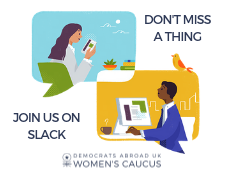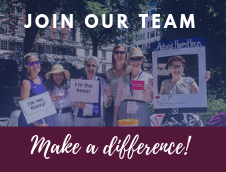Dealing with Micro-aggressions
Posted on June 8, 2019 by DAUK Women's Caucus

Be a Humanitarian
Tips by Laura Donohue
Trigger warning for racism & sexism.
Let me paint a picture for you. Let’s say a black woman is giving a talk on something she is an expert in. She has spent hundreds of hours perfecting her knowledge in this area, thus making her qualified to talk about this particular subject. After the talk, a white woman approaches her and says, “Wow, you sounded really eloquent.” The speaker thanks her for the compliment but walks away with the feeling of her stomach sinking. She’s not really sure why. She is later given an award for her talk and she begins to tear up a bit. A man remarks, “Women are so emotional.” She quickly goes to the bathroom to dry her tears. A woman sees her in the bathroom and says, “I loved your talk. Your people must be so proud.”
I imagine you might have felt the same way I did while writing this: blood boiling, stomach dropping, and body cringing. These are examples of microaggressions. It is when someone says or does something that is based in discriminatory, prejudicial, and/or derogatory ideology.
A microaggression can be intentional or unintentional.
Microaggressions aren’t limited to people.
Our environment contains microaggressions as well. For example, many products are designed without people of color in mind. This can lead to dehumanizing and under serving consumers to false convictions.
What can you do to stop microaggressions from happening?
Make sure when you hear one, if it’s safe and you have the spoons to do it, call out the microaggression such as:
“Hey, I’m pretty sure you didn’t mean to, but what you said could hurt someone’s feelings.”
“I understand you’re coming from a good place, but when you say that, it feels like you’re putting me down.”
“Wow, what kind of reaction were you expecting when you said/did that? That’s actually incredibly offensive.”
Learn more about microaggressions: Check out these resources:
What exactly is a microaggression? by Jenée Desmond-Harris
5 Microaggressions Secular People Often Hear – And Why They’re Wrong by Miri Mogilevsky
Microaggressions in Everyday Life by Psychology Today Contributors
By taking small steps, we can make big changes. Let’s all work together to make the world a better place.
Be a Humanitarian is a column where you can learn more on opinions, insight and resources on all things social work and social justice. Bookmark this column to become the humanitarian this world needs!
If you would like to request a topic or have a question, please email me at daukwomenscaucus@gmail.com and write in the subject line “Be a Humanitarian Column.”

Laura is a social worker, activist, and cat enthusiast. She enjoys sharing her knowledge of psychology and sociology to help others make the world a better place.
Category: Column, New Post for Home pageTags: dauk, DAUK WC, democrats, humanitarian, Laura donohue, social work, women's caucus, women's caucus uk
Be the first to hear from us!
Recent Posts
- Reflections on on Professor Linda Scott’s talk on gender equality and “The Double X Economy: The Epic Potential of Empowering Women”
- CHAIR’S CORNER april 2021
- Democrats Tackle the Pandemic’s Devastating Economic Impact on Women
- Chair’s Corner: October 2020
- Fight voter suppression at home and abroad to defeat Donald Trump
Follow us on Twitter
My TweetsFollow us on Instagram @daukwomenscaucus
No Instagram images were found.
Past Posts
About Us
As a caucus of the Democrats Abroad UK, we are a team of fun & fearless women who advocate for women’s issues, promote female Democratic candidates and mobilize the voting power of the US community abroad. Focused on action and community, we seek to harness the passion and power of Democratic women living in the UK to make a difference in US politics, on Election Day and every day.
Disclaimer
The posting of content on this website does not constitute an endorsement of any views by DAUK, Democrats Abroad or the Democratic Party. Links to other organizations or publications imply neither endorsement of their policies nor any association with the Democratic Party or Democrats Abroad – UK.



